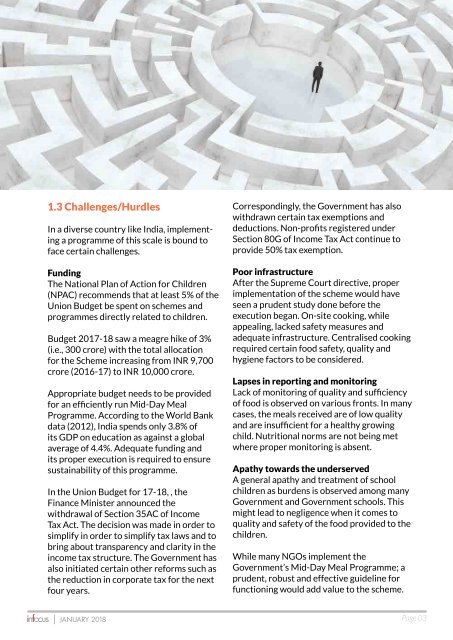Infocus 4 January 2018
You also want an ePaper? Increase the reach of your titles
YUMPU automatically turns print PDFs into web optimized ePapers that Google loves.
1.4 Proposed Measures by Akshaya Patra<br />
While a promising programme, a few measures will ensure enabling adherence to the<br />
global Sustainable Development Goals. Discussed below are some measures proposed by<br />
The Akshaya Patra Foundation.<br />
1.3 Challenges/Hurdles<br />
In a diverse country like India, implementing<br />
a programme of this scale is bound to<br />
face certain challenges.<br />
Funding<br />
The National Plan of Action for Children<br />
(NPAC) recommends that at least 5% of the<br />
Union Budget be spent on schemes and<br />
programmes directly related to children.<br />
Budget 2017-18 saw a meagre hike of 3%<br />
(i.e., 300 crore) with the total allocation<br />
for the Scheme increasing from INR 9,700<br />
crore (2016-17) to INR 10,000 crore.<br />
Appropriate budget needs to be provided<br />
for an efficiently run Mid-Day Meal<br />
Programme. According to the World Bank<br />
data (2012), India spends only 3.8% of<br />
its GDP on education as against a global<br />
average of 4.4%. Adequate funding and<br />
its proper execution is required to ensure<br />
sustainability of this programme.<br />
In the Union Budget for 17-18, , the<br />
Finance Minister announced the<br />
withdrawal of Section 35AC of Income<br />
Tax Act. The decision was made in order to<br />
simplify in order to simplify tax laws and to<br />
bring about transparency and clarity in the<br />
income tax structure. The Government has<br />
also initiated certain other reforms such as<br />
the reduction in corporate tax for the next<br />
four years.<br />
Correspondingly, the Government has also<br />
withdrawn certain tax exemptions and<br />
deductions. Non-profits registered under<br />
Section 80G of Income Tax Act continue to<br />
provide 50% tax exemption.<br />
Poor infrastructure<br />
After the Supreme Court directive, proper<br />
implementation of the scheme would have<br />
seen a prudent study done before the<br />
execution began. On-site cooking, while<br />
appealing, lacked safety measures and<br />
adequate infrastructure. Centralised cooking<br />
required certain food safety, quality and<br />
hygiene factors to be considered.<br />
Lapses in reporting and monitoring<br />
Lack of monitoring of quality and sufficiency<br />
of food is observed on various fronts. In many<br />
cases, the meals received are of low quality<br />
and are insufficient for a healthy growing<br />
child. Nutritional norms are not being met<br />
where proper monitoring is absent.<br />
Apathy towards the underserved<br />
A general apathy and treatment of school<br />
children as burdens is observed among many<br />
Government and Government schools. This<br />
might lead to negligence when it comes to<br />
quality and safety of the food provided to the<br />
children.<br />
While many NGOs implement the<br />
Government’s Mid-Day Meal Programme; a<br />
prudent, robust and effective guideline for<br />
functioning would add value to the scheme.<br />
A strong directive for<br />
selecting the NGOs to<br />
become the implementing<br />
arm of the Programme<br />
Setting up effective food<br />
safety standards and norms<br />
International<br />
Collaborations: Consider<br />
partnerships and<br />
co-operation programmes<br />
with governments and<br />
organisations of other<br />
countries that have<br />
developed technology and<br />
expertise<br />
Provisions for NGOs<br />
to raise donations<br />
from public and foster<br />
community involvement<br />
and provide guidelines to<br />
ensure accountability<br />
Provisions to enable<br />
NGOs to avail exemptions<br />
to bring clarity in claiming<br />
cooking cost subsidies<br />
Capacity building and<br />
training, specifically<br />
addressing the needs of<br />
centralised kitchen staff<br />
can be conducted for at<br />
least twice every year<br />
Inclusive participation<br />
of NGOs in district level<br />
Steering-cum-Monitoring<br />
Committee and in Social<br />
Audit Committee (SAC)<br />
A robust Grievance<br />
Redressal Mechanism<br />
An effective feedback<br />
mechanism<br />
Monitoring and<br />
evaluation (as required<br />
for centralised kitchens)<br />
on the part of the<br />
implementing NGOs must<br />
be a continuous process in<br />
order to maintain quality<br />
and safety<br />
infocus | JANUARY <strong>2018</strong><br />
Page 03 infocus | JANUARY <strong>2018</strong><br />
Page 04


